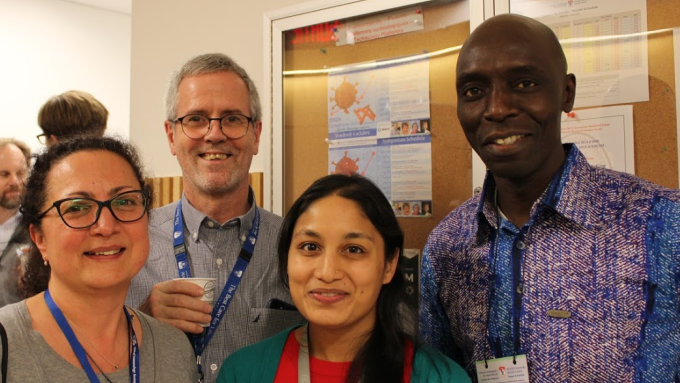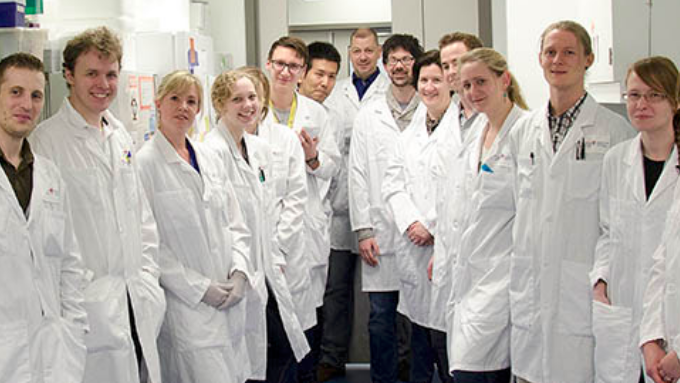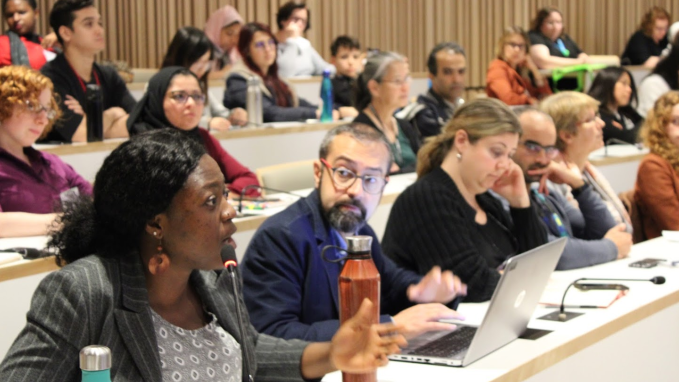Lab Information
Martin Olivier (PhD)
Senior ScientistCentre for Translational Biology
Department of Microbiology & Immunology (McGill)
Keywords
Leishmaniasis • malaria • exosome • innate inflammation • signalingResearch Interests
My research focuses on understanding how pathogens can evade the host immune response by manipulating the biochemical cascades involved in the regulation of phagocyte microbicidal functions. My pathogens of interest are protozoan parasites causing malaria, which causes up to two millions deaths annually, and leishmaniasis, which affects more than 250 million individuals worldwide. I have found that leishmania can tame the innate inflammatory response of the host, using its surface protease that can also be contained in microvesicules rapidly released within the host environment. For Malaria, my research revealed that a crystalline metabolic waste (HZ) of the parasite was responsible for a great number of inflammation-related pathologies encountered during this important infection. My lab's findings may lead to the development of new therapies against those infectious agents, which could be applied to others such as tuberculosis. They might also lead to the development of new diagnostic tools based on exo-biomarkers, and potentially to vaccine development.Team Members
| Name | Position |
|---|
Latest Publications
- Daoudi, M., Outammassine, A., Redouane, E. M., Loqman, S., Hafidi, M., Boumezzough, A., Olivier, M., Boussaa, S. & Ndao, M. (2025). Characterization of Gut Bacteria in Natural Populations of Sand Flies (Diptera: Psychodidae) from Endemic and Non-Endemic Areas of Leishmaniasis in Morocco. Microorganisms, vol. 13.
- Daoudi, M., Beaulieu, M., Dong, G., Ndao, M., Boussaa, S., Hafidi, M., Boumezzough, A. & Olivier, M. (2025). Protein Profiling of Wild-Caught Phlebotomus papatasi in Morocco: First Observation of Nematodes in Moroccan Population of Sandflies. Pathogens (Basel, Switzerland), vol. 14.
- Bora Bhowal, K., Nguyen, A. M. T., Ibarra-Meneses, A. V., Brito Lira, A., Rajan, K. S., Castaño, J. D., Beaudry, F., Bashan, A., Fernandez-Prada, C., Olivier, M., Yonath, A. & Lubell, W. D. (2025). p-Alkoxy-Substituted Anisomycins with Potent Anti-Trypanosomiasis Activity and Expanded Modes of Action. Journal of medicinal chemistry, vol. 68, p. 20264-20282.
- Hong, X., Quimby, A. E., Mavedatnia, D., Pickett, A. T., Corsten, M., Zhang, T., Tohme, A., Johnson-Obaseki, S., Khalil, C., Khoury, M., Eskander, A., Noroozi, H., Goldstein, D., De Almeida, J., Fowler, J., MacNeil, S. D., Nichols, A. C., Dort, J., Hart, R., Matthews, W., Christopoulos, A., Dayan, G., Bahig, H., Hier, M. P., Sultanem, K., Morand, G. B., Routhier-Chevrier, B., Zhang, Z. S., Belzile, M., Laref, H., Olivier, M.-J. & Maniakas, A. (2025). Oral Cavity Squamous Cell Carcinoma in Young Patients: A Multi-Institutional Study of the Canadian Head & Neck Collaborative Research Initiative. Journal of otolaryngology - head & neck surgery = Le Journal d'oto-rhino-laryngologie et de chirurgie cervico-faciale, vol. 54, p. 19160216251351562.
- Dong, G., Douanne, N., Fernandez-Prada, C. & Olivier, M. (2024). Unique Leishmania mexicana clones secrete populations of extracellular vesicles with unique protein profile and variable infectious capability. Frontiers in cellular and infection microbiology, vol. 14, p. 1443262.
- Fernandez-Becerra, C., Xander, P., Olivier, M. & Torrecilhas, A. C. (2024). Advancing research on parasitic infections: Standardized extracellular vesicle guideline. Journal of extracellular vesicles, vol. 13, p. e70009.
- Leroux, M., Lafleur, A., Villalba-Guerrero, C., Beaulieu, M., Lira, A. B. & Olivier, M. (2024). Extracellular vesicles in parasitic protozoa: Impact of Leishmania exosomes containing Leishmania RNA virus 1 (LRV1) on Leishmania infectivity and disease progression. Current topics in membranes, vol. 94, p. 157-186.
- da Silva Lira Filho, A., Lafleur, A., Alvarez, F., Piccirillo, C. A. & Olivier, M. (2024). Implication of the Annexin 1/FPR axis in leishmanial exosome-mediated Leishmania major skin hyperpathogenesis. Frontiers in immunology, vol. 15, p. 1436151.
- Fernandez-Becerra, C., Xander, P., Alfandari, D., Dong, G., Aparici-Herraiz, I., Rosenhek-Goldian, I., Shokouhy, M., Gualdron-Lopez, M., Lozano, N., Cortes-Serra, N., Karam, P. A., Meneghetti, P., Madeira, R. P., Porat, Z., Soares, R. P., Costa, A. O., Rafati, S., da Silva, A.-C., Santarém, N., Fernandez-Prada, C., Ramirez, M. I., Bernal, D., Marcilla, A., Pereira-Chioccola, V. L., Alves, L. R., Portillo, H. D., Regev-Rudzki, N., de Almeida, I. C., Schenkman, S., Olivier, M. & Torrecilhas, A. C. (2023). Guidelines for the purification and characterization of extracellular vesicles of parasites. Journal of extracellular biology, vol. 2, p. e117.
- Siddiq, A., Dong, G., Balan, B., Harrison, L. G., Jex, A., Olivier, M., Allain, T. & Buret, A. G. (2023). A thermo-resistant and RNase-sensitive cargo from Giardia duodenalis extracellular vesicles modifies the behaviour of enterobacteria. Journal of extracellular biology, vol. 2, p. e109.













